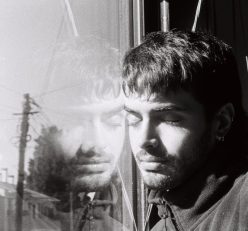To continue my run through the three albums that inspired me to produce the track, I introduce a new element to the vaporwave/neon/synth core paradigm – David Bruno.
Who is David Bruno? What is David Bruno? Why is David Bruno?

Who is David Bruno? He is a Portuguese northerner proud of his roots. In every concert, he reminds the public, “David Bruno from Gaia!” referring to the standard inclusion of Gaia in the Oporto panorama.

David Bruno is a multidisciplinary musician, producer and lyricist with a solo career and a band called Conjunto Corona. His aesthetic is a synth wave fusion with Portuguese underground urban traditionalism. The type of register he has in his solo career is what I’m influencing my work on.
What is David Bruno? He represents the resurrection of Portuguese traditionalism by acknowledging aspects of everyday life and including them inside an artistic leitmotif. In Portugal, we call it “chunga culture”.

What is chunga culture?
I searched for an equivalent word that could replace chunga, but I didn’t find anything similar. David Bruno has stated previously that the term kitsch doesn’t completely define his art, and he prefers to use the Portuguese term instead. This is the definition found in the Portuguese dictionary:
[Portugal, Informal, Depreciative] Which is of poor quality; and has no value or good taste.
It relates to another word often used to describe this culture, which has no definition in other languages, azeiteiro:
[Portugal, Informal, Depreciative] Who or who is considered ignorant, simple-minded.
We found these two adjectives present in the Portuguese streets dripping from either people, places, or events every day. It can also be found in music, art, fashion and even literature. Here are some examples:
In an interview with Nuance, o Podcast, Francisco Castro asks whether his lyrics are meant to make fun or are truly intentional, and he replies:” Some people will find it funny, some others don’t, but both can still enjoy it. However, the point is to represent reality itself without mockery.
He also referred that he is in talks with Gaia’s Hall to create an ethnographic museum dedicated to the guna:
[Portugal: Porto, Informal, Depreciative] Young urban man, usually associated with the most disadvantaged social classes, with noisy, disrespectful, threatening or violent behaviour and who has tastes considered vulgar (e.g., wearing a hat on the side, like gunas).
In David Bruno’s music, you see all these details from Portuguese chunga culture reflected through synth-wave and vaporwave music with inspiration from the 80s Portuguese pop.
Nostalgia is also something he wants to provoke in the listener, and the lyrics tell stories of fictional characters or even real people that are well-known in the city. These stories are romantic, lame, intense and dramatic. Some common themes are love (betrayal, seduction), crime (going to jail, bad businesses), depression (loneliness, driving around the city), and self-analysis (inhaling iodine, drinking a very fine cocktail, going on vacation to a very standard hotel, buying made in Portugal products, eating shellfish, Portuguese lifestyle).

I think it’s better when you “flex” on stuff that is seen as bad quality. What do you think it’s best? Flexing your brand-new rolex or your 1995 green Nissan Micra?
David Bruno for Nuance, o Podcast

This portugality revival is also a way to turn the page in the contemporary music scene, where most things are influenced by content made in the US or even the UK because what is made in Portugal is not considered legitimate. His music, as said before, is a fusion of Portuguese pop, synth wave, sometimes vaporwave, sample-based, and sometimes hip-hop. His act is always accompanied by a guitarist player, Marquito, and DJ António Bandeiras. On a project released last year called David & Miguel, he co-produces with Mike El-Nite and together made a romantic pop synth wave album. His latest project was a collaboration with Samsung, where he explains the new functionalities of the model S22 through romantic lyrics.
Some examples:




